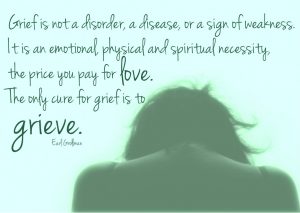The raw grief of losing someone you love can have a person wonder if they might go mad.
- Sleep is all but impossible.
- The physical pain of grief is something that can surprise and overwhelm those new to grief
- The shock of loss can make life seem surreal, unreal, or give a person a feeling of "This is not really my life"
- A person's eyes can become raw and heavy with the buckets of tears that are shed, and seemingly are always ready to reappear at any time, even when it seems impossible to cry more.
- Conversely, a person may feel dead inside, feel flat and lifeless. Tears are absent, the person goes through the motions, almost on "autopilot" in a way that frightens others
There is no one right way to grieve. Any variety of reactions can be a "normal" part of grieving. Grieving the loss of someone you care about is "normal"--but it is definitely not easy. Grief is exhausting, painful, relentless, and interrupts the regular rhythms of life.
What is "Grieving"?
Many connect "grieving" only with the loss of a loved one...our culture has officially sanctioned this grief with rituals around death. However, many other kinds of grief reactions also occur: to loss of a job, loss of physical function through disease or accident, loss of an important role as when children become adults. That kind of grieving can feel lonely because as real as it is to you, it is not understood by others.
Most people do not require counselling for grieving. Grief is something that needs to be process...and many have family and friends who love and care for them. Weeping with those who also knew the person, who love you, and want to be there to support you is an important component of grieving--and counselling should not circumvent or replace the supports that are already in place in a person's life.
However, occasionally it can be helpful to get some extra support from a therapist while working through grief:
- when the grief has additional components of trauma that need to be processed, as when there is a crime or suicide
- when there are elements of the grieving that you feel you can't share with others, as when there are parts of the story you feel you would like to keep private. For example, a wife discovers a pornography addiction her husband has after his death.
- when there are confusing and additional factors to grief. For example, the current loss of a grandfather triggers memories of the turmoil surrounding a parent's divorce, or a wife feels she has worked through the loss of her husband, and then is "ambushed" by further grief when a distant cousin passes away.
- when an "anniversary" of the death brings a new wave of grief, and it seems that processing needs to happen all over again, and there seems no obvious place to do it
- when family and friends are far away and not able to be present for you during the time of grief. Human compassion is vital, and to have someone present to witness and be present to hear the stories and memories is important.

Grief is not a disorder, a disease, or a sign of weakness. It is an emotional, physical and spiritual necessity, the price you pay for love. The only cure for grief is to grieve.
Earl Grollman
Grief work can be meaningful and profound, providing the possibility to understand and appreciate the role of the deceased person in your life, to further understand yourself and how life has shaped how you process this loss, and preparing you to resiliently incorporate the memory of the loss into a meaningful part of your life as you bravely work to move forward.
